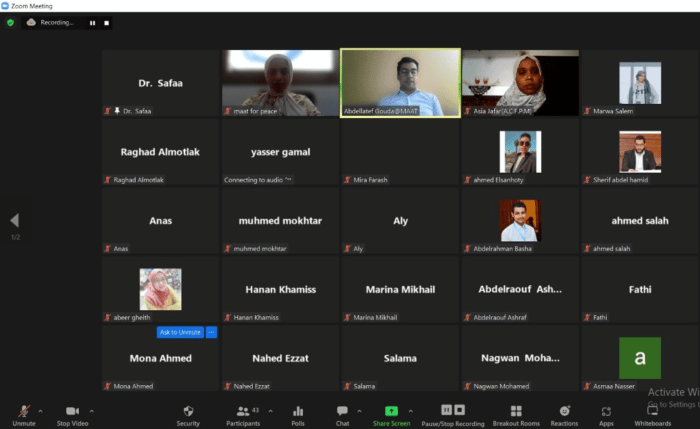Safaa Saber: Prolonged conflicts abort all attempts to achieve sustainable development in our Arab world
Asia Al-Jaafari: Sudan must promote the concept of citizenship and support international partnerships to advance development
Raghad Al-Mutlaq: Turkey's violations of the Syrians' right to water have negatively impacted development processes
Al Kathiri: The Yemeni crisis needs a Yemeni solution
Marwa Sami: Extreme weather phenomena such as desertification have exacerbated the humanitarian situation in Libya
Mukhtar: The Charter of the League of Arab States must be amended to enhance the effectiveness of its resolutions and reduce the risk of armed conflicts
Maat for Peace, Development and Human Rights organized a virtual event on June 30, 2022, on the sidelines of its participation in the activities of the 50th session of the United Nations Human Rights Council in Geneva. The event discussed the role of Arab regional mechanisms in achieving the sustainable development, focusing on the countries of the Arab conflict such as Syria, Libya, Sudan, and Yemen. The event was attended by a number of speakers from different countries suffering from conflicts, as well as speakers specialized in Arab affairs to discuss how to recover from conflicts and provide a guiding vision for achieving the development process.
Dr. Safaa Saber, professor of international relations at the Faculty of Economics and Political Science, Alexandria University, stated that settling armed conflicts requires an international mechanism for early warning to reduce these conflicts, and work to limit the spread of these conflicts geographically within a single country. As to Arab mechanisms to promote sustainable development, she recommended the Arab League to adopt collective diplomacy approach, which would give an additional advantage to the joint Arab action, as it would oblige all state parties to implement the resolution it issues.
Speaking of the Sudanese context, Asia al-Jaafari, Executive Director of the Azza Center for Professional Media, pointed out that Sudan's main crisis is attributed to tribal disputes. The concept of tribalism is superior to the concept of citizenship, which was reflected on the humanitarian conditions of millions of citizens. In addition, the security solution adopted by successive Sudanese governments, as the only mechanism for resolving disputes, has not proven effective in solving the crisis, whether in eastern Sudan or in Darfur, which affected the state's infrastructure and reconstruction projects. al-Jaafari concluded that the solution in Sudan is to achieve a society based on national consensus, peaceful coexistence, social justice and global and regional partnership.
Commenting on the situation in Syria, Raghad Al-Mutlaq, an independent Syrian journalist and civil society activist, said that after a decade of the Syrian conflict, a number of armed factions are still in control of some Syrian lands, and the prolonged conflict has exacerbated the suffering of the Syrians in the various camps. Besides, successive Turkish violations of the Syrians rights, by seizing parts of Syria’s share in the Euphrates River, led to the continued deterioration of the humanitarian situation.
For his part, the Yemeni lawyer, Sami Anis Al-Kathiri, clarified that the humanitarian situation in Yemen is not a spur-of-the- moment, but rather a natural result of the accumulation of previous policies. Yemen is witnessing the largest humanitarian crisis in the world, with more than 17 million Yemeni are in critical need of food assistance. Al-Kathiri concluded by saying that the Yemeni crisis needs a Yemeni solution, one that reinforces and deepens the concept of citizenship.
In her presentation of the humanitarian and development situation in Libya, Marwa Sami, the Libyan feminist activist said that the Libyans have been facing a sharp decrease in precipitation and water scarcity for years, which has exacerbated the phenomenon of desertification and the lack of agricultural crops, thus undermining all efforts for development. The prolonged conflict also exacerbated the security situation, which gave rise to alarming phenomena such as the kidnapping of children, violence against women, and increased rates of domestic violence. She concluded by stressing the need to strengthen the role of international organizations in overcoming the Libyan political crisis that casts a shadow on the humanitarian and development situation.
The event concluded with a guiding vision for achieving the development process in the Arab region, presented by Muhammad Mukhtar, a researcher at Maat for Peace, Development and Human Rights. However, the League of Arab States has not taken serious steps to resolve the Arab-Arab armed conflicts, and its charter has shortcomings that reduce its effectiveness. He recommended the need for the countries excluded from the League of Arab States to return to it again and not to reject any country far from the charter of the League. He also called for coordination and exchange of experiences in the fields of education and development and benefit from global experiences, and concluded by highlighting the need for civil society organizations to participate in the League’s activities because they are the closest to the humanitarian situation on the ground.
The event was moderated by Abdellatef Gouda, a researcher at the Sustainable Development Unit at Maat for Peace, Development and Human Rights, who stressed at the end of the event the necessity that prolonged internal armed conflicts would affect its social system. Gouda also called for putting an end to these conflicts through strengthening the roles of regional mechanisms and reducing human rights violations that would impede sustainable development processes.















